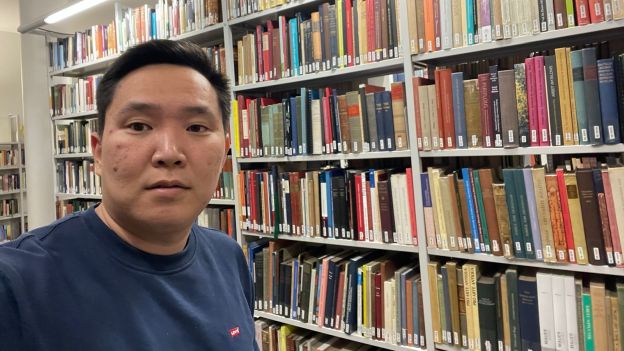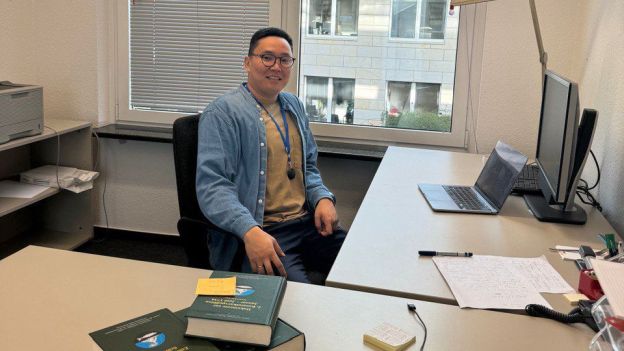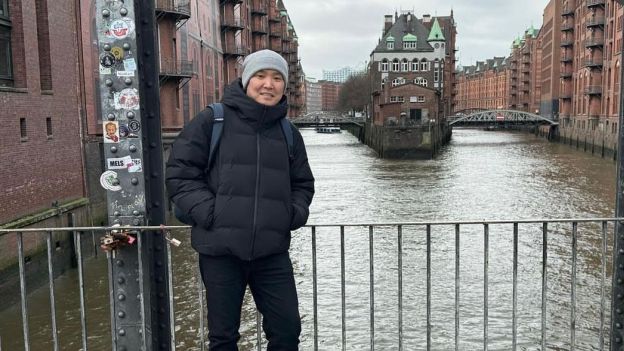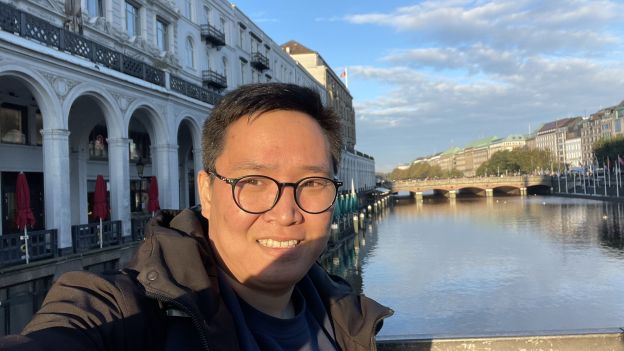Aisen Vasilev
 Privat
Privat
Aisen Vasilev during his research at University of Hamburg, here at the library
„I am grateful to the DAAD-Stiftung, and my supervisor Otto Habeck for the opportunity to undertake an internship at the Institute of Ethnology at the University of Hamburg, which will help in my scientific career. These days will forever remain in my memory.“
As classical historian writing his doctoral thesis, Aisen Vasilev also conducts interdisciplinary research. During his Ulla-Johansen-Scholarship, he dedicated himself to ethnological research in the Republic of Sakha (Yakutia).
He describes his experiences in Hamburg and at the Ethnological Institute as follows:
In April 2023, I was lucky enough to win the Ulla-Johansen-Scholarship by the DAAD-Stiftung.
My scientific internship began on October 1, 2023, and continued until March 2024. The topic of my individual research was called “The role of the ethnic factor in the formation of the Yakut bureaucracy in the 19th century”, where the scientific supervisor was a professor from the Institute of Ethnology at the University of Hamburg, Otto Habeck. I had to show how the ethnic factor influenced the change in ethnic identity among officials through long-term coexistence with the Yakuts and their culture.
As a classical historian, it was interesting for me to use an interdisciplinary approach in my research, and ethnological science helped with this. When writing the article, I worked in libraries and museums in Germany, where I discovered a lot of materials about Yakutia and Siberia of the 19th century, got acquainted with works on methodology.

Privat
Aisen Vasilev at work in his office at the Ethnological Institute
For example, while researching in Germany, I discovered the writings of Adolf Ermann, who in the 1820s. was engaged in research of Yakutia. In his work “Reise um die Erde durch Nord-Asien und die beiden Oceane in den Jahren 1828, 1829 und 1830. - Berlin: G. Reimer, 1833-1848” I found information about the process of changing the identity of the Russian population in the Yakut region.
In addition to my supervisor, the scientific community of the institute at the University of Hamburg provided - including graduate students, interns, researchers - great assistance in writing the study. In one of the discussions we were able to consider the function of the Yakut language among the Russian population as a lingua franca.
In addition, I participated in colloquiums that were held every week, got acquainted with the local system of dissertation defense (PhD), and was able to participate in scientific conferences. I was able to take part in the scientific conference in Berlin "Borderland Capitalisms Reconsidered: Economic Practices and Contested Resources in (Post-)Imperial Siberia and Central Asia (1822–1929)", which relates to my topic. Here I met many interesting researchers.

Privat
Visiting the Speicherstadt Hamburg
One of the pleasant experiences of the internship was meeting the fellows in Bonn in October (editor’s note: The scholarship holders of the DAAD-Stiftung are invited to the so-called orientation seminar organized by the DAAD). I met wonderful, interesting, energetic guys from different countries with whom I formed very close friendships.
I heard from previous fellows that the late Ulla Johansen was always present at the meetings of fellows in Bonn, it is a pity that now we will not be able to meet with her, but I am very happy that the scholarship still continues to exist and support young scientists from Yakutia.

Privat
A walk alongside the Alsterakaden is a must
I had never been to Europe before, and this was a great experience for me not only for my scientific career, but also for getting to know the culture, primarily German. I thought adaptation would be very difficult, but I was met by wonderful, responsive people who helped me adapt to the new environment. The Germans are very careful about the environment, they are strictly involved in sorting garbage, I was surprised when I met a lot of elderly people in Rissen who were riding bicycles or driving cars.
Here I made a lot of friends with whom I hope we will keep in touch for many years to come. While in Germany I also visited the Elbphilharmonie, was able to attend the main Bundesliga match – Borussia vs Bayern, etc.
At the beginning of my internship, I took German courses and received a language certificate through the online platform DUO (Deutsch-Uni Online). Although I gained basic knowledge of the German language, this was a big step in learning for me.
During this time, I gained a lot of academic experience and expanded my field of scientific knowledge.
As of November 2024.


